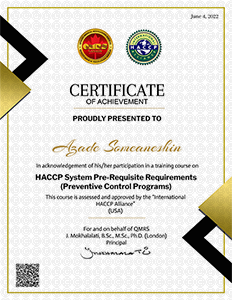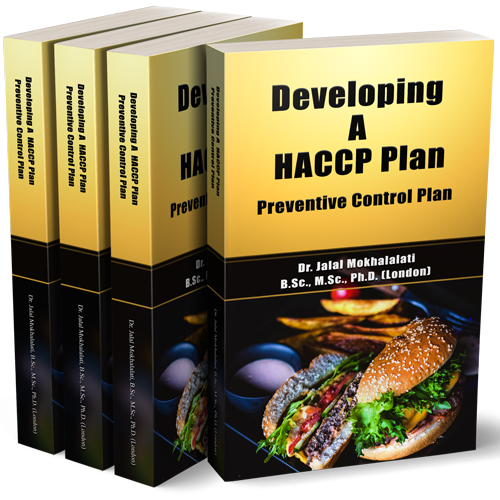Objective
To provide trainees with information on the HACCP principles, tasks, development, and application as recommended by the FAO guideline.
Learning Outcome
Participants should be familiar with the importance of HACCP as a program for food safety and for international trade.
Trainees should learn how to establish the HACCP team, Complete product description form and identification of product ingredients materials, construct a complete flow diagram and plant schematic, identify all potential hazards in a process and to consider the appropriate control measures, how to determine critical control points, (CCP) using the Codex decision tree.
Also, trainees will learn how to establish critical limits for each CCP, to establish monitoring, corrective action and verification procedures for each established CCP and to establish documentation and records of the HACCP plan.
Who will benefit
1. Quality assurance personnel/inspectors
2. HACCP team members (coordinators)
3. Operational (production) managers
Course Contents
1. Assemble the HACCP Team (Task 1)
2. Describe Product (Tasks 2 And 3).
3. Construct Flow Diagram and On-Site Confirmation of Flow Diagram (Tasks 4 & 5).
4. List All Potential Hazards and Conduct a Hazard Analysis (Task 6, Principle 1). Determine CCP (Task 7, Principle 2)
5. Establish Critical Limits for Each Critical Control Point (Task 8, Principle 3).
6. Establish A Monitoring System for Each Critical Control Point (Task 9, Principle 4).
7. Corrective Actions (Task 10, Principle 5).
8. Verification Procedures (Task 11, Principle 6).
9. Record Keeping (Task 12, Principle 7).
Handout Materials
When the training is conducted On-Site, trainees will be given a binder, containing the training course slides and the exercises materials.
Sources(Guidelines)
1. Canadian Food Inspection Agency (CFIA): Regulatory requirements: Preventive controls Requirements for the Safe Food for Canadians Regulations (2021).
2. CFIA: Controls for establishments: Requirements for the Safe Food for Canadians Regulations. (2019).
3. FAO/WHO; Codex Alimentarius General Principles of Food Hygiene CXC 1-1969 Adopted in 1969. Amended in 1999. Revised in 1997, 2003, 2020.
Know your instructor
Dr. Jalal Mokhalalati, B.Sc., M.Sc., Ph.D.
Dr. Mokhalalati holds a Ph.D. degree in the field of human nutrition from University of London. Since his graduation in 1981, he wrote a number of books and scientific papers, and he worked in various countries for different sectors, including teaching at the University of Gaza.
In 2001, Dr. Mokhalalati retired from Abbott Laboratories as the Head of Medical and Regulatory Affairs Department in S. Arabia and started his own consultation office in Canada to serve the food & drug industry in all aspects of establishment licensing (GMPs), and Health Products registration with Health Canada.

Certification
Trainees who complete the course and accomplish at least a 75% score will receive a “Certificate of Achievement” from QMRS
Course Curriculum
Developing A HACCP Plan (Preventive Control Plan)
Test your Knowledge
-
Certificate Requirements
00:00 -
The Quiz
Download Course
-
Course Content in PowerPoint
-
LevelExpert
-
Total Enrolled2
-
Duration18 hours
-
Last UpdatedAugust 2, 2023


